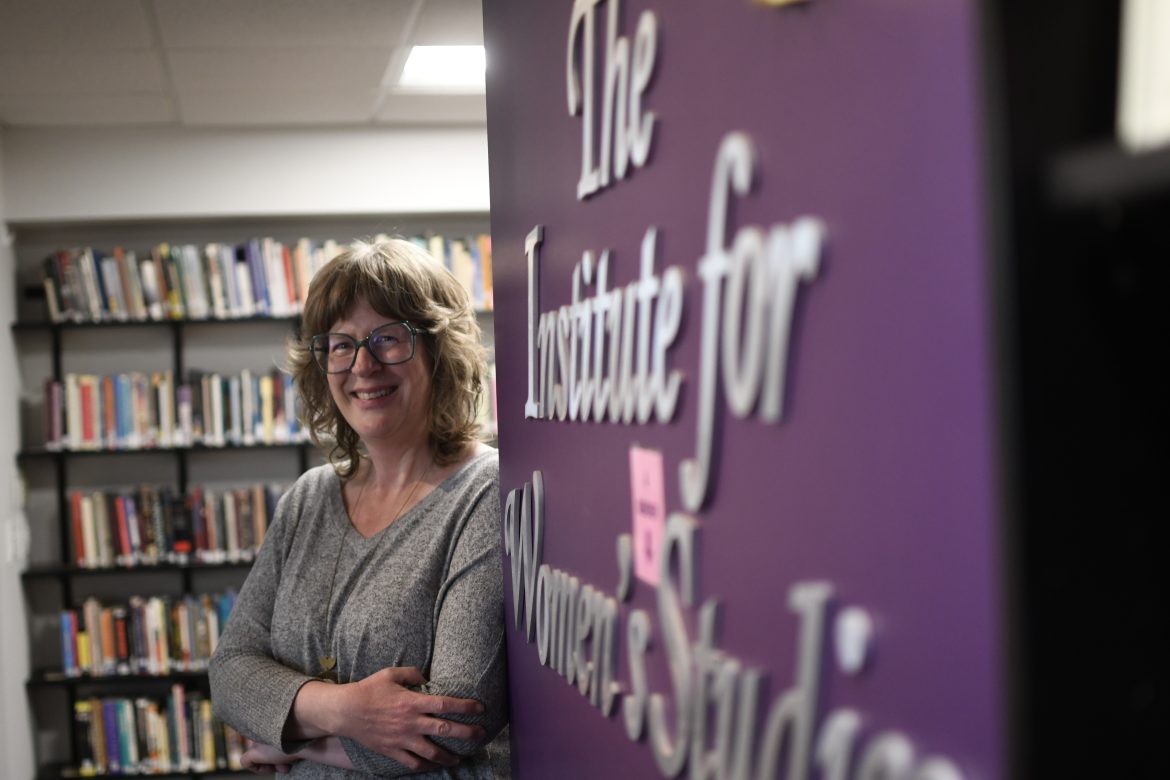Patricia Richards, the Director of the Institute for Women’s and Gender Studies at the University of Georgia, stands in UGA’s Women’s and Gender Studies Library on March 19. Richards discussed how the celebration of Women’s History Month has changed since its establishment in 1987. “We’re in a moment (where) recognizing (and) celebrating Women’s History Month, as well as Black History Month and all these other recognitions, is more important now (than ever),” Richards said. Photo by Grady Dunston
Patricia Richards, the Director of the Institute for Women’s and Gender Studies at UGA, discusses her career as well as the importance of Women’s History Month.
Variety Editor Adah Hamman: What inspired you to pursue a career in Women’s Studies?
Director of the Institute for Women’s and Gender Studies at the University of Georgia Patricia Richards: I wanted to become a sociologist and I did, but my interests evolved to focus on women’s activism, not just around gender equality, but all forms of social equality. I’m happy that (my interests) did because the vibrancy of thought, critical connections and analytical thinking that happens in spaces like the Institute of Women’s and Gender Studies is incredibly exciting and generative. We have both (an) intellectual and practice-based community here that I love being a part of.
We can look (at) an incredibly long history of women’s activism in this country around reproductive justice, especially the work of women of color over the past several decades who have been on the front lines of those struggles. (That history) is important to pay attention to.
AH: Are there any women who have inspired you in either your personal or your academic life?
PR: (Some of) my research actually (took) place in Chile, and beginning with my dissertation, I) did interviews with women from a range of backgrounds, all of whom had some involvement with resisting military dictatorship (in Chile). More than anyone, it is those women who I interviewed, and other women like them, who have modeled such courageousness and bravery in fighting for, not only their rights, but for the rights of their families and communities that have inspired me to take their example and to be equally brave in my everyday life.
AH: In your opinion, why is it important to celebrate Women’s History Month?
PR: Women’s contributions have tended to be overlooked over the course of history, but I think (the celebration is) more than that, as well. Despite advances that have been made towards gender equality — not just among women and men, but for people of all genders — we still don’t live in a society that is (truly) equal. So, I think that Women’s History Month both recognizes and celebrates the contributions of women, but is also a reminder of the ongoing struggle toward equality for all genders.
AH: How has the celebration of Women’s History Month evolved over time?
PR: It’s something that started out small and over time came to be something that was accepted. People all over the (University of Georgia) have events in recognition of Women’s History Month, just as they do for Hispanic History Month, Black History Month and so forth. So, over time, (the celebration) has become kind of normalized.
AH: What do you think are some of the most important contributions that women have made to society?

Patricia Richards, the Director of the Institute for Women’s and Gender Studies at the University of Georgia stands in front of UGA’s Institute for Women’s and Gender Studies on March 19. Richards thought that significant moments in women’s history could help in addressing contemporary issues in society. “Struggles from other points in history can be really instructive for us in how to face this moment and how to face it in a way that doesn’t put one group of people above another group of people,” Richards said. Photo by Grady Dunston
PR: The main point of having Women’s History Month is to draw attention to the roles and contributions of women in all aspects of society. (Their contributions) have tended to be ignored over the course of history, so it’s hard for me to identify (particular) emblematic contributions, but those contributions are everywhere and (used) all the time.
AH: What are some of the biggest challenges women face today, and how can history help us address them?
PR: We’re facing a real crisis (where women) don’t have a right to bodily autonomy right now in this country. We are not equal citizens, and that chills me to the bone. I think that we can turn to movements for reproductive justice in Mexico, Argentina and Colombia that have taken place recently and look to them for inspiration, strategy and methods by which (we can) fight for the return of our rights. Also, we can look (at) an incredibly long history of women’s activism in this country around reproductive justice, especially the work of women of color over the past several decades who have been on the front lines of those struggles. (That history) is important to pay attention to.
AH: What are some common misunderstandings about feminism?
PR: (Many) people think that feminism is about putting women above men, and it’s not. Feminism is about equality for all people. I think another misconception is that feminism stands on its own, apart from other social struggles, (which) I think (is) a mistake. Feminism, in order to be successful, has to be intersectional and recognize the ways that struggles for gender equality are also bound up with struggles against racism, xenophobia (and) all forms of discrimination.
